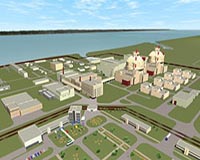 |
Tehran (AFP) Nov 1, 2009 Russia's envoy to Tehran on Sunday urged Iran to sign on to a UN-drafted nuclear fuel deal in a bid to resolve the controversy over its atomic drive, which he said lacks "complete transparency." Alexander Sadovnikov's comments came a day after US Secretary of State Hillary Clinton warned Tehran that world powers had limited patience as Iran dilly-dallied over offering a categorical response to the proposal. "This is not to trick Iran in order to take its low-enriched uranium out of its hands," Sadovnikov, Moscow's ambassador to Tehran, said in an interview with the official IRNA news agency. "We believe that reaching this agreement and signing the technical contract to produce fuel for the Tehran reactor is beneficial to Iran and will help in resolving the nuclear issue," he said. The deal if approved will see Iran's low-enriched uranium (LEU) sent to Moscow for further enrichment and conversion into fuel, whereafter it will be returned for use in the Tehran reactor which is monitored constantly by the International Atomic Energy Agency (IAEA). But the proposed agreement has been facing stiff opposition from top Iranian officials who say it is a Western sleight of hand aimed at getting the Islamic republic to suspend its uranium enrichment work. Western powers led by Washington suspect Iran's uranium enrichment drive is aimed at making weapons, a charge strongly denied by Tehran. Sadovnikov said Tehran's nuclear controversy lacks "complete transparency" and must be quickly resolved, but added any more sanctions against Iran to halt the galloping atomic programme was not the right approach. "We agree with the opinion of our partners in the group of six who believe that Iran's nuclear programme, especially in some issues related to its past nuclear activities, lacks complete transparency," Sadovnikov said. Russia, and five other world powers -- Britain, France, China, Germany and the United States -- are engaged in high-profile talks with Tehran to allay concerns over its atomic programme. US President Barack Obama, angry after Tehran recently disclosed it was building a second uranium enrichment facility, has indicated that if Iran does not come clean on its nuclear programme it could face a new round of sanctions. Russia, however, "believes that negotiations must be approached from a calculated position without threats and scare," Sadovnikov said. "As Russian officials have repeatedly said, threats and sanctions will only complicate the situation and lead to a dead end." Moscow has recently, however, said that sometimes sanctions are "inevitable." The six world powers and Tehran are expected to meet in few weeks, after the first round of talk held in Geneva on October 1. The Geneva talks were followed by a specific round of discussion in Vienna between Russia, France and the United States, where the fuel deal was drafted by the IAEA. Iran has asked for more talks on the fuel deal, while its Foreign Minister Manouchehr Mottaki said in Kuala Lumpur on Sunday that technical experts of world powers too felt a need for a "new round of talks" on issues raised by Tehran. Meanwhile Iranian opposition to sending Tehran's LEU abroad mounted on Sunday. "Any pre-condition to deliver the fuel to Iran is unacceptable and any talk of sending our uranium must happen after receiving the fuel," Iranian parliament deputy speaker Abu Torabi told ISNA news agency. Iran's judiciary chief Sadeq Larijani also voiced opposition to the transfer of LEU. "It is not in the interest of the country and according to the NPT (Non-Proliferation Treaty) the developed countries have to deliver us the fuel," he told ISNA. Israel -- Middle East's sole if undeclared nuclear state -- has said the fuel deal is a "positive step" in stopping Tehran's nuclear drive. Share This Article With Planet Earth
Related Links Nuclear Power News - Nuclear Science, Nuclear Technology Powering The World in the 21st Century at Energy-Daily.com
 Bulgaria seeking new investors for nuclear plant: report
Bulgaria seeking new investors for nuclear plant: reportSofia (AFP) Oct 30, 2009 Bulgaria is seeking new investors for its nuclear plant project in Belene following the withdrawal of German utility RWE, Economy and Energy Minister Traicho Traikov said in an interview Friday. "We will invite new investors via an international tender. We have already discussed the possible participation of French, Italian and Russian companies in it," Traikov told the daily 24 Hours. ... read more |
|
| The content herein, unless otherwise known to be public domain, are Copyright 1995-2009 - SpaceDaily. AFP and UPI Wire Stories are copyright Agence France-Presse and United Press International. ESA Portal Reports are copyright European Space Agency. All NASA sourced material is public domain. Additional copyrights may apply in whole or part to other bona fide parties. Advertising does not imply endorsement,agreement or approval of any opinions, statements or information provided by SpaceDaily on any Web page published or hosted by SpaceDaily. Privacy Statement |